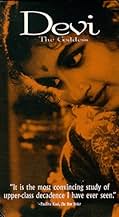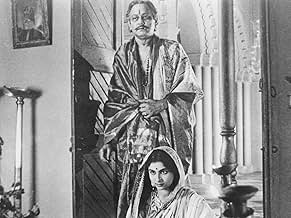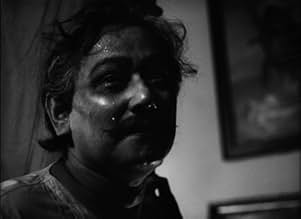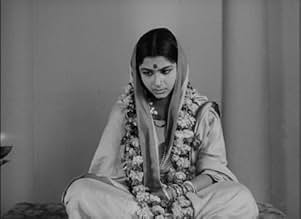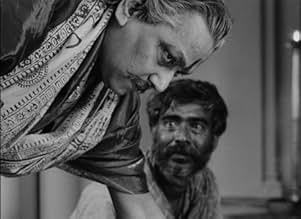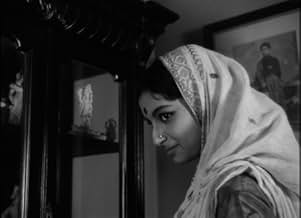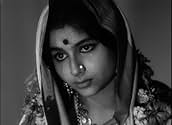AVALIAÇÃO DA IMDb
7,7/10
3,1 mil
SUA AVALIAÇÃO
Adicionar um enredo no seu idiomaA young woman is deemed a goddess when her father-in-law, a rich feudal land-lord, has a dream envisioning her as an avatar of Kali.A young woman is deemed a goddess when her father-in-law, a rich feudal land-lord, has a dream envisioning her as an avatar of Kali.A young woman is deemed a goddess when her father-in-law, a rich feudal land-lord, has a dream envisioning her as an avatar of Kali.
- Direção
- Roteiristas
- Artistas
- Prêmios
- 1 vitória e 1 indicação no total
Soumitra Chatterjee
- Umaprasad
- (as Soumitra Chattopadhyay)
Karuna Bannerjee
- Harasundari
- (as Karuna Bandyopadhyay)
Purnendu Mukherjee
- Taraprasad
- (as Purnendu Mukhopadhyay)
Arpan Chowdhury
- Khoka - Child
- (as Shriman Arpan Chowdhury)
Anil Chatterjee
- Bhudeb
- (as Anil Chattopadhyay)
- Direção
- Roteiristas
- Elenco e equipe completos
- Produção, bilheteria e muito mais no IMDbPro
Avaliações em destaque
'Devi' is so good I went out and bought the whole 'Apu Trilogy.' Which was expensive, and I'm poor. 'Devi' is so good that I've watched it enough times to be able to mouth along to it in Bengali, and I don't speak Bengali. "Khoka khotay?" "Aaaa... cheko ta." (I'm now learning Bengali because I love this movie so much!)
There is such an intricate web of relationships between the characters, that it reminds me of Macbeth. The story is very specifically about the Indian culture (it's revealing investigation into Hinduism could have happened nowhere else) but its tale of strife between generations is something anyone can understand and feel.
If you would like to talk about this film, please email me! "Namoskar." (I'm pretty sure that means 'goodbye!')
There is such an intricate web of relationships between the characters, that it reminds me of Macbeth. The story is very specifically about the Indian culture (it's revealing investigation into Hinduism could have happened nowhere else) but its tale of strife between generations is something anyone can understand and feel.
If you would like to talk about this film, please email me! "Namoskar." (I'm pretty sure that means 'goodbye!')
Satyajit Ray made "Devi" in 1960. It was only his sixth film after completeing his 'Apu Trilogy' and "The Music Room" but it's much less well-known and little seen today. It's also a masterpiece. The great Chhabi Biswas, (he of "The Music Room"), once again plays a rich, lonely old man who comes to believe his daughter-in-law is a reincarnation of the Goddess Kali. If the tale is a fanciful one it's grounded in the harsh realities of the India of the time, (it's set in the mid-nineteenth century), and its heart is a heart of darkness. Goddess or witch, the end result is the same; such superstition can only have a tragic outcome and this is one of Ray's finest tragedies. Working again with what was basically his stock company, Ray draws superb performances from his cast and like so much of his work, this is a great ensemble piece, superbly shot by Subrata Mitra and scored by Ali Akbar Khan. It's a film that cries out for restoration and rediscovery.
"Devi" (Hindi, 1960): Directed by Satyajit Ray, and banned in India until the intercession of Nehru, this is the story of a lovely 17 year old wife, who is suddenly labeled as a "Goddess" (while her husband is absent to complete his final exams in college), due to a dream ("vision") by her father-in-law. What follows is a fascinating, multi-angled look at the transitional Indian culture (and MOST cultures, frankly). Is this any different, any worse, or any more desperate than seeing the face of Jesus in a grilled cheese sandwich or the grain of a wooden door? Is her overnight change in status unique? Are the people who have confused motives, hopelessness, or malleable minds any less vulnerable here and now? The quality of the video copy I viewed was rough a copy of a copy of a copy yet even then, the power of Ray's vision shines through. This is a serious, beautiful, insightful, tragic film. (It has something of a "cousins" relationship to the film "Anchoress".)
Examining the dangers of blind faith & superstitious beliefs through the adversity of a young woman who finds herself deified by her father-in-law following a vivid dream, Devi captures the absurdity of religious delusion and the oppressive role a patriarchal society plays by not giving women their own voice even when they are held to a divine status.
Written & directed by Satyajit Ray (The Apu Trilogy & The Music Room), the story aptly introduces us to all the characters before the main plot surfaces but once it kicks into action, things only get more tragic & heartbreaking from there on. Ray makes sure his critique doesn't mock the Hindu religion, and is mainly concerned with the grave consequences of such blind conviction.
The religious fervour that erupts from one man's idiotic interpretation of a dream is depicted with both honesty & understanding. The splendid camerawork, steady pace & skilful editing do their part but what makes the ride so gripping, involving & interesting is the strong & sincere performances from the committed cast, with Sharmila Tagore impressing the most in the designated titular role.
Overall, Devi (The Goddess) is yet another socially relevant film from Satyajit Ray that tackles a sensitive subject matter with elegance & composure, and delivers a rich, evocative & thought-provoking experience. As is the case with most films of this esteemed auteur, the story brims with a timeless quality, the social themes it addresses have a universal appeal, and the sensible storytelling makes it worth a shot.
Written & directed by Satyajit Ray (The Apu Trilogy & The Music Room), the story aptly introduces us to all the characters before the main plot surfaces but once it kicks into action, things only get more tragic & heartbreaking from there on. Ray makes sure his critique doesn't mock the Hindu religion, and is mainly concerned with the grave consequences of such blind conviction.
The religious fervour that erupts from one man's idiotic interpretation of a dream is depicted with both honesty & understanding. The splendid camerawork, steady pace & skilful editing do their part but what makes the ride so gripping, involving & interesting is the strong & sincere performances from the committed cast, with Sharmila Tagore impressing the most in the designated titular role.
Overall, Devi (The Goddess) is yet another socially relevant film from Satyajit Ray that tackles a sensitive subject matter with elegance & composure, and delivers a rich, evocative & thought-provoking experience. As is the case with most films of this esteemed auteur, the story brims with a timeless quality, the social themes it addresses have a universal appeal, and the sensible storytelling makes it worth a shot.
After watching Satyajit Ray's The Apu Trilogy (1955-1959), which are now my favourite films of all time, I was looking forward to watching Devi, the next film Ray directed after The Apu Trilogy. Although I couldn't feel the same kind of emotional connection with the characters in Devi that I felt in The Apu Trilogy, this film was thought-provoking and very intriguing to watch.
Devi dealt with a serious issue in Bengali society at the time in a mature manner and Ray's direction and cinematography for this film was just as superb as The Apu Trilogy. It starred Soumitra Chatterjee and Sharmila Tagore once again as a married couple, like in Apur Sansar (the final part of The Apu Trilogy). However, whereas it was Soumitra who played the lead role in Apur Sansar, this time it's Sharmila who plays the lead role in Devi. Her performance was very subtle for the first half but her delusional performance towards the end was very convincing. Overall, I'd highly recommend this movie to any Satyajit Ray fan.
8/10
Devi dealt with a serious issue in Bengali society at the time in a mature manner and Ray's direction and cinematography for this film was just as superb as The Apu Trilogy. It starred Soumitra Chatterjee and Sharmila Tagore once again as a married couple, like in Apur Sansar (the final part of The Apu Trilogy). However, whereas it was Soumitra who played the lead role in Apur Sansar, this time it's Sharmila who plays the lead role in Devi. Her performance was very subtle for the first half but her delusional performance towards the end was very convincing. Overall, I'd highly recommend this movie to any Satyajit Ray fan.
8/10
Você sabia?
- CuriosidadesSharmila Tagore was just 15 when she filmed this role.
- Citações
Kalikinkar Roy: [while Doyamoyee strokes his feet] Do you know who I'm worried about? I'm worried about your Christian husband. You never know the intention of boys today.
- ConexõesFeatured in A História do Cinema: Uma Odisseia: Sex & Melodrama (2011)
Principais escolhas
Faça login para avaliar e ver a lista de recomendações personalizadas
- How long is The Goddess?Fornecido pela Alexa
Detalhes
Bilheteria
- Faturamento bruto nos EUA e Canadá
- US$ 93.215
- Tempo de duração1 hora 33 minutos
- Cor
- Mixagem de som
- Proporção
- 1.37 : 1
Contribua para esta página
Sugerir uma alteração ou adicionar conteúdo ausente



